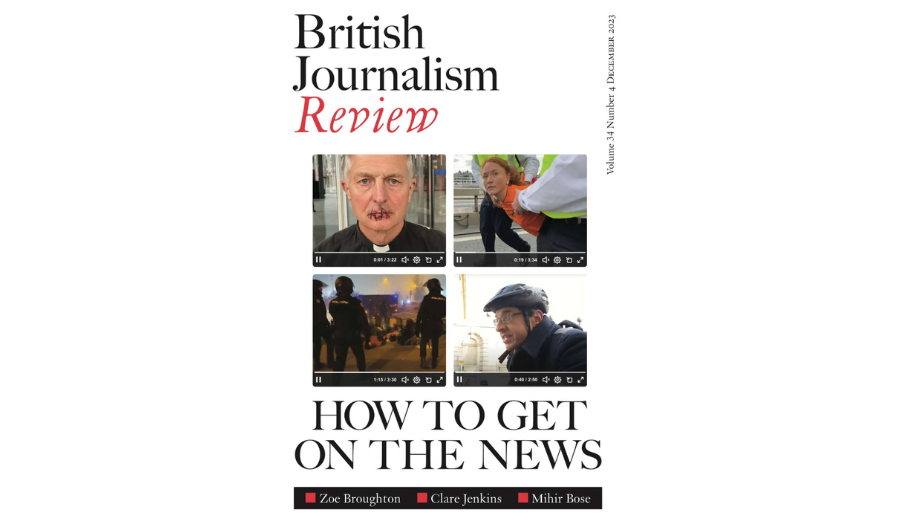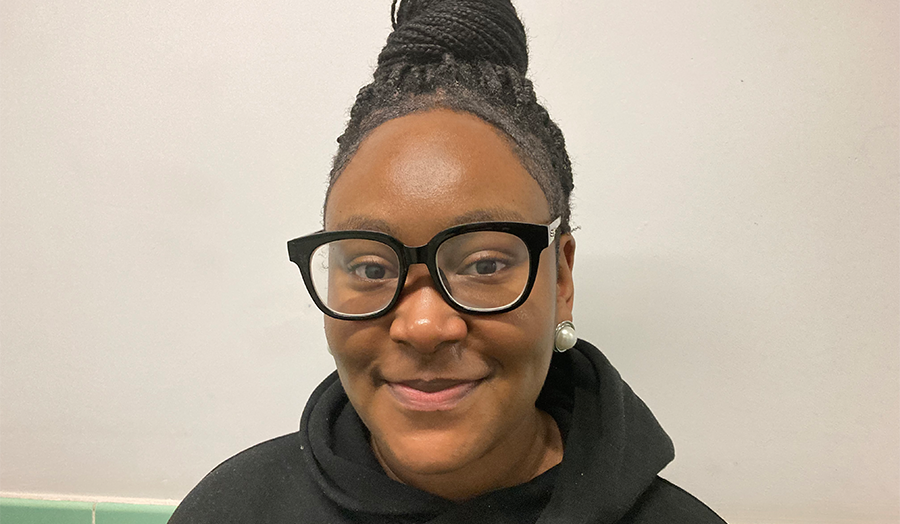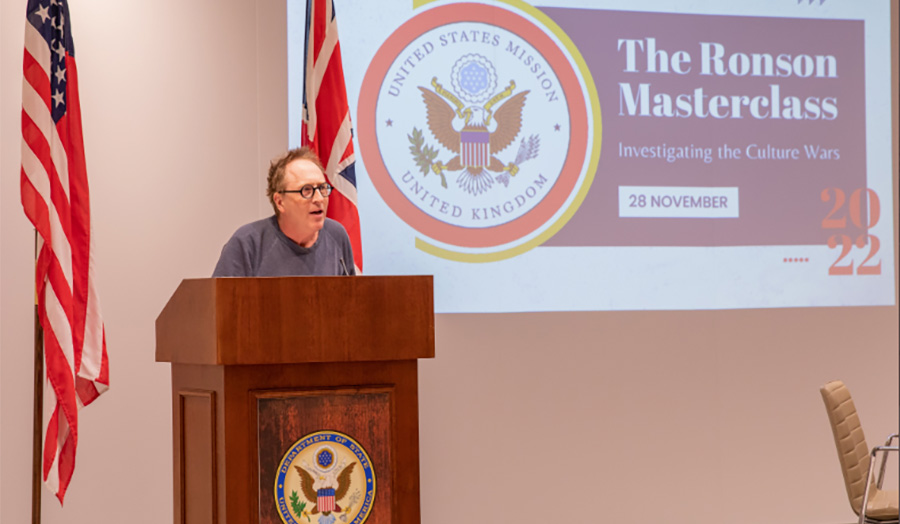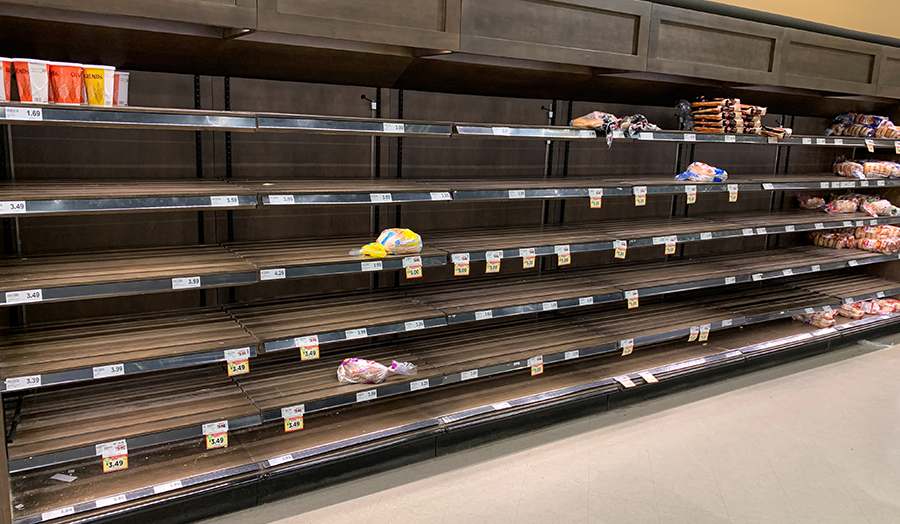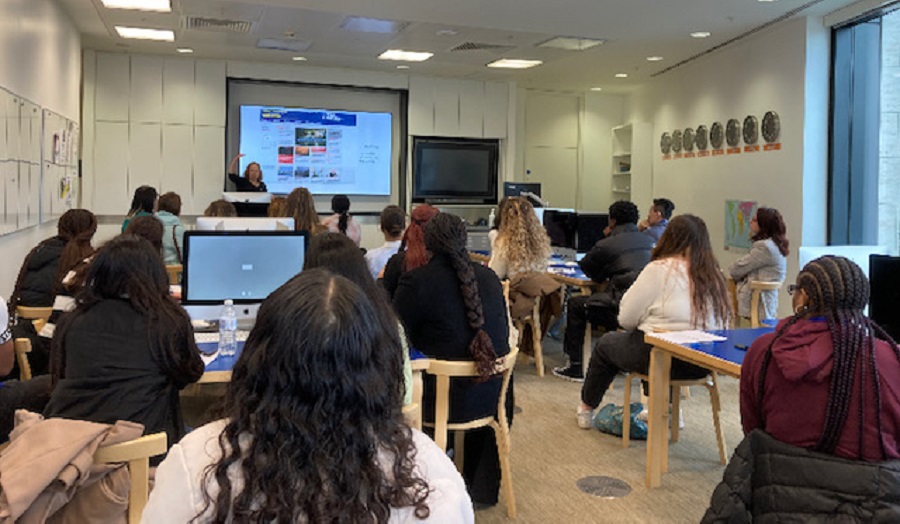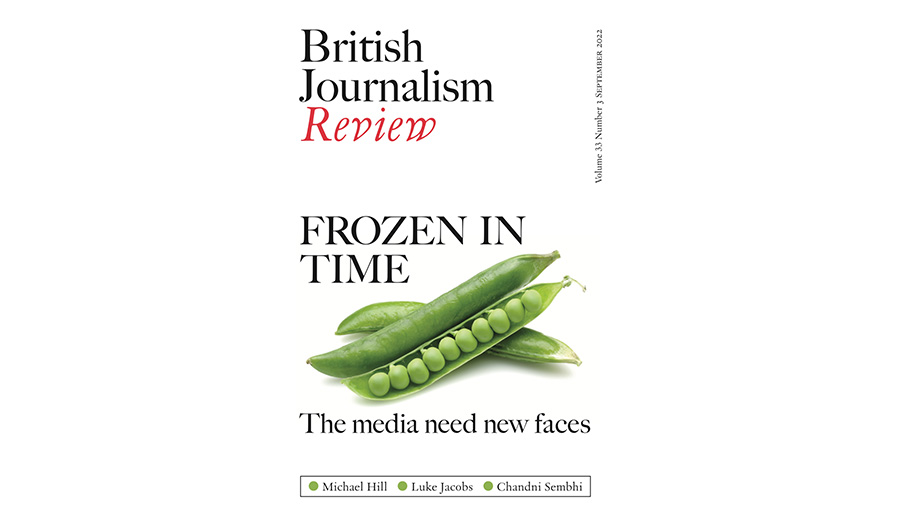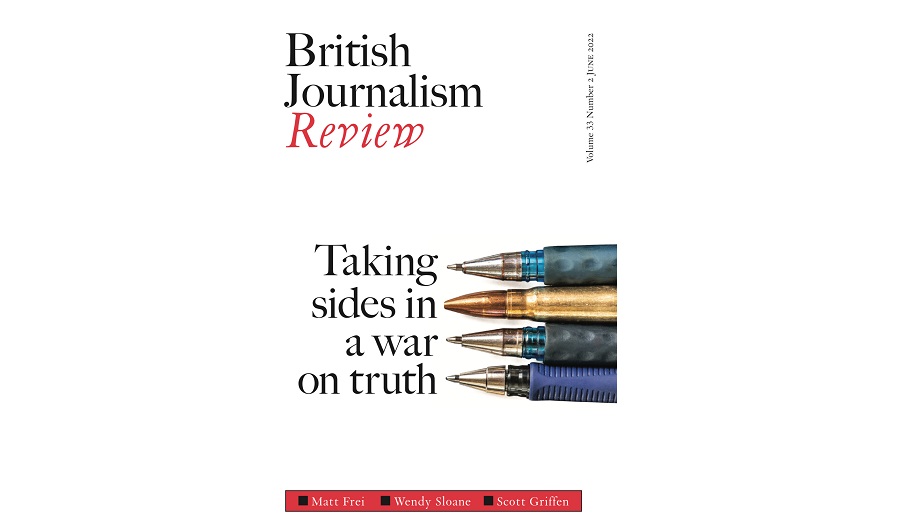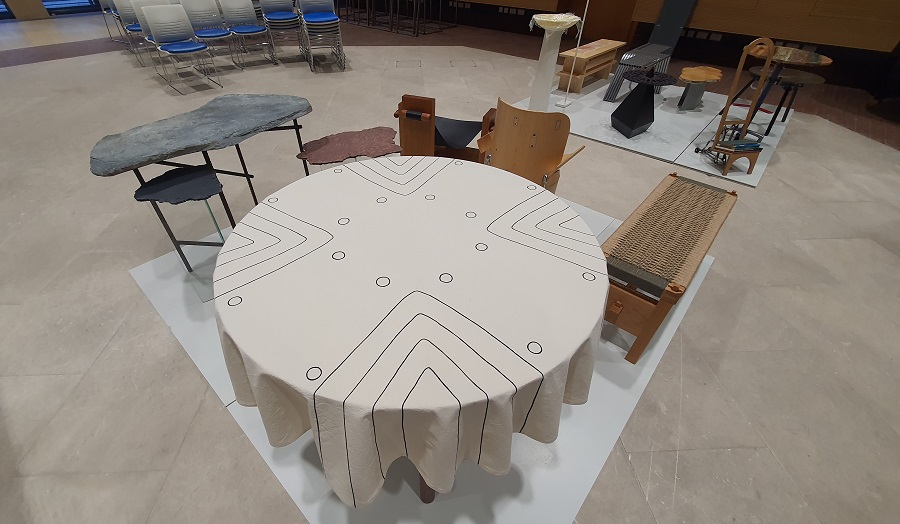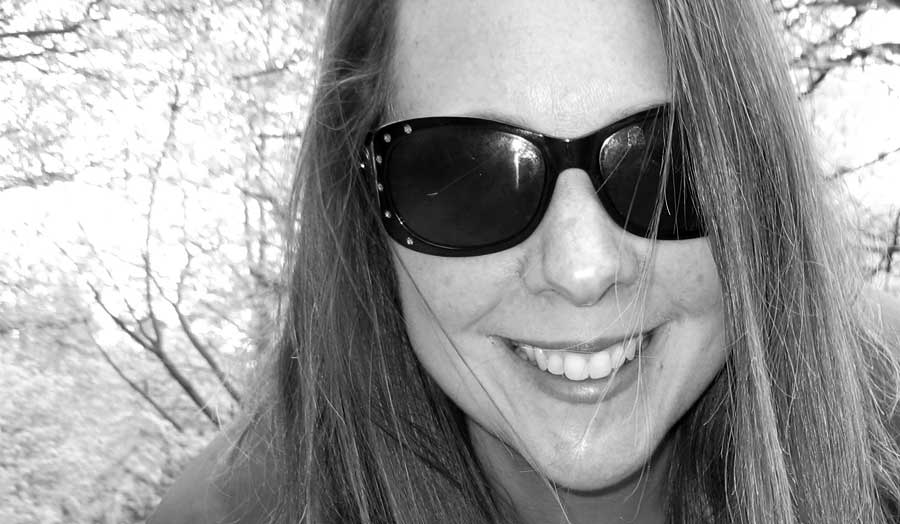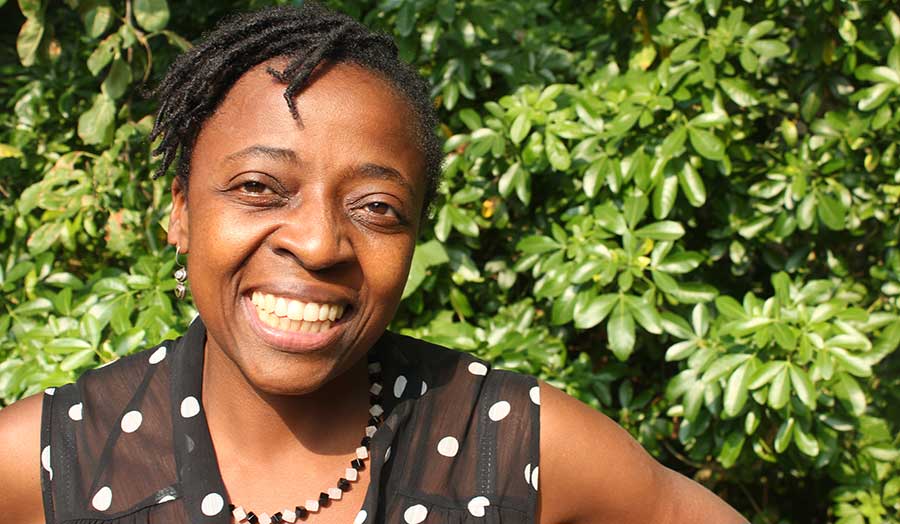Why study this course?
Channel your talent for writing, your instinct for seeking out the truth and your ability to engage an audience with a compelling story through this exceptional journalism degree in London. You’ll learn how to survive in a rapidly changing industry, cover breaking news in our state-of-the-art newsroom and develop a range of journalistic writing for different media channels and genres.
Keep up-to-date with the latest news from our journalism staff, students and alumni by following their Instagram and Tumblr pages. You can also follow their Twitter page.
More about this course
This Journalism degree offers a lively and professional introduction to the practices and ideas of journalism. You'll cover breaking news in our newsroom, enjoy exciting news days and develop a range of writing skills for multimedia journalism and learn video, audio and mobile techniques of a rapidly changing industry, taught by respected practitioners.
You’ll find a wealth of relevant work placement opportunities to give your career a headstart. Our students have had placements at media organisations including InStyle Magazine, BBC Radio 1, Your Media London, Islington Gazette, Hayes FM, Business In The Community, Bracknell News, October Films, sport.co.uk, Bliss, Press Association, Sunday Times, ITN and Cambridge Evening News, as well as the Daily Mail.
You’ll have the chance to visit newspapers, TV studios and the places where news is made. We host a range of well-known speakers, recently including Professor Steve Jones to talk about science in journalism, Gary Younge from the Guardian and Tom Symonds from the BBC to talk about breaking big stories from phone hacking to paedophilia.
Learning to use both the journalist’s techniques for gathering and telling stories and the academic’s skills in analysing and marshalling arguments will leave you with a strong portfolio to enter the marketplace. Join us and find your niche in the rapidly changing media landscape.
You can follow us on Twitter for news and events from alumni, students and staff.
You can get a taste for life at our School of Computing and Digital Media by taking a look at our showcase of recent student work.
Assessment
You're assessed through coursework, in-class tests, individual and group projects. The final assessment must be work of a publishable standard; it can be video, audio, written or multimedia.
Professional accreditation
We're currently in the process of applying for accreditation by the Broadcast Journalism Training Council.
Fees and key information
Apply nowEntry requirements
In addition to the University's standard entry requirements, you should have:
- a minimum of grades BBC in three A levels (or a minimum of 112 UCAS points from an equivalent Level 3 qualification, eg Advanced Diploma)
- English Language and Mathematics GCSE at grade C/grade 4 or above (or equivalent)
Applicants with relevant professional qualifications or extensive professional experience will also be considered on a case by case basis.
If you don't have traditional qualifications or can't meet the entry requirements for this undergraduate degree, you may still be able to gain entry by completing our Journalism (including foundation year) BA (Hons).
These requirements may be varied in individual cases as prospective students will be invited to an interview.
Mature students with previous relevant experience are encouraged to apply.
Accreditation of Prior Learning
Any university-level qualifications or relevant experience you gain prior to starting university could count towards your course at London Met. Find out more about applying for Accreditation of Prior Learning (APL).
English language requirements
To study a degree at London Met, you must be able to demonstrate proficiency in the English language. If you require a Student visa (previously Tier 4) you may need to provide the results of a Secure English Language Test (SELT) such as Academic IELTS. This course requires you to meet our standard requirements.
If you need (or wish) to improve your English before starting your degree, the University offers a Pre-sessional Academic English course to help you build your confidence and reach the level of English you require.
Modular structure
The modules listed below are for the academic year 2023/24 and represent the course modules at this time. Modules and module details (including, but not limited to, location and time) are subject to change over time.
Year 1 modules include:
- This module currently runs:
- all year (September start) - Tuesday afternoon
This module introduces students to the history of journalism, honourable and dishonourable, to the roles it has played and continues to play in society, and to the main theories used to understand how it works. Focusing on the UK, it will also highlight ethical concerns and take account of wider, global issues and contexts. This content will be used to develop transferable skills of critical thinking and analysis, crucial to employability.
Political accounts, investigations which have transformed lives, human interest stories, arts reviews, in-depth profiles, cartoons, speculative columns, hot gossip, sports, fashion, celebrity… and now, for something completely different! What does it all mean and why do we produce and consume it? By the end of the module, students won’t necessarily have any answers, but they should be able to ask much better questions and have developed critical and analytical skills.
Working together, individually and in small groups, students explore major events and stories, past and present. They develop skills of presentation and analysis, learning when to use academic writing and when the more vivid narrative of journalism can play an equally effective role. In addition, they will explore critically and practically, the techniques used in writing and broadcasting of the past so that they can better develop their own professional capacities in the future.
Discussion, presentations, research, screenings and visits will all play a part in the development of critical thinking skills, which will be workshop-based.
The module will be assessed by three essays and contributions to an online journal, which is moderated by tutors at the end of the year. - This module currently runs:
- all year (September start) - Wednesday morning
This module introduces students to the practical and analytical skills (including looking at ethical problems) involved in professional news writing, newsgathering, collaborating in teams to produce stories, evaluating sources and revising writing.
Students will be required to produce news copy in professional formats, which will include online posts using images, video and audio and the use of mobile technology.
They will research and write a series of news articles and publish them to the class. They will learn newsgathering skills: analysis of reports, press releases and user-generated content; deducing news content from press conferences and announcements (diary items); following up human interest via face-to-face and phone interviews, including vox pops and the death knock; organising a team response to a major event; follow-up stories and case studies; analysing facts and figures to use in sidebar boxes; cultivating contacts and FoI.
They will study contemporary news coverage to develop an understanding of how news stories are reported and created. They will discuss ethical, legal and commercial constraints on journalists and how different genres serve different markets.
Accuracy, subediting, headlines and search engine optimisation will be important, as will developing stories through new media, images, audio, and video. This to include links to Youtube, soundcloud etc, with multimedia elements.
The module will be assessed by two portfolios, using mixed media, and a timed class exercise. These will test students’ developing news sense, news gathering and news writing.
Contribution in class will be measured by a journal recording the student’s activity, weekly updated, moderated by tutors at the end of the teaching period
- This module currently runs:
- all year (September start) - Friday morning
This module introduces students to the basics of journalistic reporting and reporting.
Dovetailing with the Practical Journalism module, it focuses more sharply on the process of reporting, particularly within a local context. Students will examine community and local news from an editorial standpoint and be encouraged to dig deeper into their immediate environment, creating stories and integrating them with background. This maps the acquisition of skills within a professional setting. They will also learn the basic of taking photos to add to their local blog, including the use of copyright and where to legally source photos.
They will look at where stories come from and further the knowledge needed for professional practice. They will locate themselves within local beat journalism, aided by on and off-diary reporting exercises, visits to local community projects and official local authority meetings.
By using case studies and deepening their understanding of using recordings and face-to-face interviews, including the ethical problems that such exercises pose, they will explore techniques of research for journalism.
Working together, individually and in small groups, they will explore local events and stories, past and present. They will develop skills of presentation and analysis. Discussion, research, screenings and visits will all play a part in the development of critical, transferable thinking skills.
The module will be assessed by two portfolios of short news articles and of slightly longer features, created on the student’s own blogs with multimedia content and photographs, a timed in-class news writing exercise and contributions to class via an online journal which is moderated by tutors at the end of the year.
- This module currently runs:
- all year (September start) - Thursday morning
This module will equip students on all journalism-related courses with the essential transferable skills of good writing, ensuring a solid grounding in the essential building blocks of grammar, style and rhetoric.
Teaching takes place through a workshop mix of lectures, discussions, site visits, presentations and practical exercises, all aimed at mastering transferable skills and maximising employability in all branches of the communications industry. The theory and practice of correct grammatical usage will underpin all other work.
Students will focus on the arts of news writing, subbing (proof-reading), and headline writing, explored through exercises inside and outside class, and through critical analysis of previously published work. Peer and self-reflective critiquing will be crucial, as they are in the media today.Students develop familiarity with writing in varied journalistic styles, including news, features, reviews, columns, sketches and comment. They will gain an understanding of why and how to write in different styles for different audiences.
They will also start to work on their own unique journalistic style. As part of this, they learn how to focus a critical eye on other published work, using examples from a wide range of publications including newspapers, magazines, online formats, trade journals.
Two sessions will introduce students to voice training.
The module will be assessed by three in-class grammar tests, a portfolio of short articles, a portfolio of longer articles and engagement with class by online journal, moderated by tutors.
Year 2 modules include:
- This module currently runs:
- all year (September start) - Wednesday afternoon
Continuing on from the first-year core Reporting Skills, students in Advanced Reporting will develop the skills and techniques necessary to succeed in more advanced forms of reporting, including investigative journalism, features, and in-depth interviews and profiles.
For Students studying on this course, you will learn to identify subject matter and potential readerships; master interviewing and editing techniques in audio and video; learn how to find original angles; undertake focused, widely sourced research on individuals and issues; and conduct on-the-spot reportage. You will also analyse statistics and develop stories based on them. This will be taught through a combination of workshops, masterclasses and site visits.
This module aims to develop students’ skills in multi-platform journalism. Via practical workshops and news days, which closely copy the latest UK industry working practices in modern multimedia newsrooms, you will learn the basics of radio journalism, as well as TV/video reporting skills, including camera and editing skills, using cutting-edge software and equipment. This will reinforce your understanding of the need for 360-degree journalism in today’s society.You will work on projects within class with a view to publishing them online via the course website, www.hollowayexpress.co.uk
Holloway Express, thereby providing an outward-facing portal for future employability.The second half of the course will involve four six-hour long news days, which will offer chances to transform understandings into practice.
Successful completion of this module will involve the preparation of journalism and employability portfolios to be developed for presentation to prospective employers.
Assessment will involve three portfolios of journalism, and an employability portfolio.
Contribution to news days will be both self-assessed and moderated by tutors.The module will be assessed as follows:
Two portfolios of six stories (news and features) in total, comprising one podcast and one video package, both of which must show evidence of professional writing and newsgathering skills learnt in this module,
A piece of long-form journalism (2,500 words) showcasing investigative reporting (this can use multimedia).
Four assessed News Days, where students will work collaboratively to create radio and TV news programming reflecting the day’s news agenda. Contributions to an online journal will assess class contribution, moderated by tutors at the end of the year. - This module currently runs:
- spring semester - Wednesday morning
This module provides opportunities for students to gain experience of the journalistic working environment and to enhance and extend their learning by applying and building on their academic and journalistic skills. It is core for all journalism-related courses.
Students must find their three–week placement (the number of working days stipulated for accreditation by the Broadcast Journalism Training Council) themselves, deploying employability and professional skills and their own developing portfolios. These will be measured and supported by the assessments.
Placements of fifteen working days with one employer (or fifteen working days divided between two employers) will be supported by a session of workshops, of which students must attend the majority.
Assessment will be by a reflective learning log, including ethical considerations and remarks by employers; a presentation to class and on the class blog; self-assessed engagement with classes when not on placement, measured by online journal.
- This module currently runs:
- all year (September start) - Thursday morning
This module covers what student journalists need to know about how Britain works and the place of journalism within debates about ethics and the legal system. It is core for all journalism-related courses as everyone in the media needs to know how the system works.
Classes will look at the ethical and judicial frameworks and constraints which control the reporting of legal matters, including crime and its contexts. Students will explore these subjects from the industry viewpoint, learning how to find and develop stories within the social and political landscape of Britain today.
Within public adminstration, classes will survey: national systems of government and representation; local government; citizen remedies and freedom of information; foreign policy, the EU and defence; social services and education; health; the judicial system (civil) and human rights; ermegency services; the criminal justice system, including police; finance and the stock exchange.
At the heart of this course is the study of ethics. How journalists ought to behave – and what we can learn from those who do not behave properly – is particularly important to the profession. The public relies on the profession to give information. How should journalists get that information and how convey it?
Ethics gives a deeper meaning to the study of the legal system for journalists. Classes will locate the law which journalists need to know, both civil and criminal, within a broader ethical framework in today’s multi-platform, multi-national world. Analysis of current cases and case law will be as important as knowledge of existing frameworks and codes.
Field trips to magistrate’s courts and local authority meetings will be key to personal experience and understanding, as will guest speakers.
Discussion, research, screenings and visits will all play a part in developing students’ critical thinking skills and the professional skill of accurate, legally acceptable writing.
The module will be assessed by two portfolios (one of which includes multi media), an essay, an online journal moderated by tutors at the end of the year, and an in-class legal knowledge test which students must pass in order to complete the module (an accreditation stipulation by the Broadcast Journalism Training Council).
- This module currently runs:
- all year (September start) - Tuesday afternoon
- all year (September start) - Tuesday morning
Students will work in teams in the newsroom to produce multi-platform journalism consistent with industry practice. This module is core for journalism students and many allied courses.
Working within tight deadlines and adhering to professional codes and standards, students will write and edit copy and scripts, headlines and picture captions and learn how to use words, images, graphics, audio and social media to construct narratives appropriate to the story and platform. They will develop competencies in the use of audio and video recording and editing, making particular use of smartphones, and learn how to draw traffic to their work by means of social media.
In order to perform these tasks, students will take on a number of roles specified in published job descriptions. Students will be required to produce CVs, covering letters and portfolio websites displaying their own work, appear before an interview board and pitch story or programme ideas to commissioners. This will develop their social as well as writing skills.
The development of students’ professional practice will be informed by sessions led by guest speakers from the industry and field trips to working news environments.
The second half of the course will involve four six-hour long news days, which will offer chances to transform understandings into practice.
Successful completion of this module will involve the preparation of journalism and employability portfolios to be developed for presentation to prospective employers.
Assessment will involve three portfolios of journalism, and an employability portfolio.
Contribution to news days will be both self-assessed and moderated by tutors. - This module currently runs:
- autumn semester - Thursday afternoon
This module aims to provide students with a rigorous understanding of the history, theory and practices of documentary photography, and to enable them to develop key photographic skills pertinent to the practice of documentary photography. The module will introduce students to the history, theory and practice of contemporary documentary photography. The module is slanted towards practice, and provides an opportunity for students to develop photographic skills or enhance their existing photographic skills, as well as their understanding of documentary photography. The module will provide practical tuition in the skills of street photography, portraiture, photographing objects in motion, and narrative photography, and will encourage and support students in the conception and development of their own documentary photographic projects. The module will also provide historical and theoretical contexts for students’ developing photographic practices, enabling them to critically reflect on their own practice as documentary photographers.
- This module currently runs:
- autumn semester - Friday morning
This module offers an introduction to styling within fashion journalism and related industries, underpinned by an understanding of the relationship between the media and industry, surveying the cultural and global business issues which fashion journalists must understand. Merchandising and trend-spotting will be examined along with the role of the stylist in media and marketing. It will be helpful to anyone studying fashion marketing, beauty marketing and journalism.
Weekly assignments will explore different arenas for and types of styling, developing employable skills in sourcing and resourcing looks and products for writing, photography, retail, events, blogging/vlogging, trends and catwalk shows, and new media networking. These will be discussed in class and reflectively via online journal.
Summative assessment will join these strands and take the form of a major styling project, focusing on a specific fashion business, event, publication or store, chosen in consultation with the module teaching team.
Assessment tasks will be: a video styling exercise with 300-word document, a portfolio of four short pieces (no more than 300 words each, with images for each); a final piece of two 500-word articles which creates an original story with 10 self-created images (or can be video of 2 minutes), with an analytic log of research and sourcing (up to 1,000 words); and engagement with class, assessed through self-reflective journal.
Year 3 modules include:
- This module currently runs:
- all year (September start) - Thursday morning
Students will work in teams in the multimedia newsroom to research, write and present multi-platform journalism, specifically in video and audio formats. The module is key for journalism and fashion marketing and journalism students, providing essential skills for today’s workplaces.
Working to specified job descriptions, students will take on responsibility for the editorial and production processing and use knowledge to spot and prepare stories for forward planning diaries, with due regard to ethical and professional considerations.
Student will work to tight deadlines and adhere to professional codes and standards during editorial cycles, which will periodically be explored in four newsdays and in two newsweeks. These will develop employability and focus around industry practices, including news conferences, bulletins and multimedia links.
Students will be given the opportunity to work in specific professional genres (news, features, sport etc) or specific media (audio, video, newspaper, online). They will write, subedit and re-version copy for different platforms and purposes. They will use mobile technology and social media to enhance news values.
Students will be encouraged to develop a contacts book and to publish work in professional publications, as well as on the course website. Language, writing and presentation styles will be developed to match or improve on contemporary industry practice.
Through tutor coaching they will improve skills such as video, audio and copy editing, writing and editing copy and scripts, headlines and picture captions and learn how to use words, images, graphics, audio and social media, including tweeting, to construct narratives appropriate to stories and platforms. News weeks will develop team working and technical proficiency.
Student development will be informed by sessions led by guest speakers from the industry and field trips to working news environments.
Assessment will involve three portfolios of journalism. Engagement with class will be self-assessed and moderated by tutors. - This module currently runs:
- all year (September start) - Wednesday morning
Creating Packages is core for journalism-related courses. It develops the advanced professional skills taught at level 5: identifying subject matter and potential readerships, research, interviewing and editing techniques, on-the-spot reportage, and finding original angles and relevant sources for stories, to a stage where students originate and source the elements for their own journalism packages, based on a subject area of their own choice, rather than as directed by tutors. This is an exciting chance to create your own magazine in print and online.
Each package will have three instances, in print and online (or vice versa), to reflect the multimedia nature of such products in contemporary journalism. News days will reinforce a professional sense of urgency and the need to meet deadlines.
The module allows students to enhance their skills in writing news features arising from topical issues, using data for feature articles, developing more in-depth interviews and/or feature stories based on interviews and research. Students will be directed towards identifying subject matter and potential readerships, on-the-spot reportage skills, and finding original angles and relevant sources for their stories. Students also learn design, lay-out and multimedia skills.
Assessment will be of three portfolios of work, adapted for printed text and for online; two critical, self-reflective commentaries; an individual feature; and contribution to class, self-assessed through journals where students will self-assess their own work, their editorial roles and their participation in group contributions to class, including group and individual oral presentations (where attendance is mandatory). This will be moderated by tutor.
- This module currently runs:
- all year (September start) - Wednesday afternoon
This module allows students to explore in depth a topic of their own choice, arising out of previous study and subject to supervisor approval. It offers an exciting way to make an area of expertise all your own, whilst developing both journalistic and academic communication skills.
It must be a piece of longform journalism, aimed at a specified audience, not a study of journalism. It can be in any journalistic medium.
Independent but supported learning and sustained research and writing will provide a focus for refining and drawing together a wide range of transferable skills.
These must result in a high quality piece of journalism with an academically rigorous critical and research underpinning.
A synopsis and project management schedule, demonstrating a research strategy submitted at week 8, will provide a signpost for further work. A three-hour refresher session on law will prompt attention to legal constraints.
- This module currently runs:
- spring semester - Friday morning
Arts Journalism investigates and teaches the specific professional techniques and practices of arts journalism – in music, film, literature, art, architecture, dance, theatre, and other areas of student interest which relate directly to employability. Throughout this 15-week module, the arts are placed in the context of the relationship between journalist practitioners (in print, radio and online) and the arts industries. It is suitable for anyone wanting to explore these areas.
Field trips and guest speakers will demonstrate in depth the connection between professional journalists and arts practitioners.
This module also surveys the cultural, historical and global business issues and conditions within which arts journalism takes place, enabling self-reflective and critical perspectives.
Students are encouraged to publish their work inside the university website and outside, building up contacts and a portfolio of pieces.Students are assessed through a portfolio of practical and critical work, which can be across platforms, a diary of their critical reactions to arts events, and a final 1,000-word piece of arts journalism.
Class participation will be assessed through contribution to an online journal.
- This module currently runs:
- autumn semester - Tuesday morning
This module looks at the professional skills of the journalist in politics, public affairs and society. It is both theoretical and practical, offering an introduction to the world of advocacy for anyone intrested in acquiring these skills.
Students will examine the historical and political contexts of journalism, the role of charities and special interest groups such as environmental and rights campaigners and how to cover lobbying and direct action. They will analyse the ethics of committed journalism and debate how to justify bias.
They will explore, through discussion, presentation and professional practice, links with PR and internal comms professionals, viral and social media, humour and satire, human interest stories and running appeals.
They will produce original work for a campaign of their choice, which they must pitch to their classmates and tutor.
Formative assessment will be an essay on how campaigning has changed events and whether such campaigning is justified
An overview of media law and ethical considerations will underpin a summative project of campaigning journalism which will combine original research, in either a series of three short articles or one long article and a log of events and contacts. - This module currently runs:
- autumn semester - Friday afternoon
This module develops skills in and critical understanding of writing and reporting on fashion across multiple platforms including magazines, blogs, social media and video content. Looking at the latest trends and influence in the industry, and covering editorial and commercial case studies, students will develop working skills in fashion journalism, blogging, broadcasting and photography.
Assessment will be through group presentation, a portfolio of work, a video and presentation, fashion blog project and tutor-moderated self reflection, using online journal.
What our students say
“The lectures were fun and informative and have equipped me with vital skills that I am already using in the real world. Not only were we taught about journalism as a subject, we were constantly being prepared for a working environment and this has been invaluable as I have so many other friends who have graduated from other universities who were not geared up with the necessary tools or confidence to enter a real journalism working environment. The support and encouragement I was given by my lecturers was beyond anything I could have hoped for. Not only did the lecturers support me academically they were also there to help me with personal issues. Had this support not been there I very much doubt that I would have been able to complete the course and graduate with my 2:1. I had a documentary film commissioned by Vice while still studying at London Met. Had it not been for my lecturers and the newsroom production module I would not have had the confidence or skills needed to make this film. My time at London Met has been some of the best years of my life, I have learned so much not only about journalism but also about myself, the journalism course has given me so much and I will forever be grateful and thankful.”
Kartel Brown, graduate
“The lecturers who make up the journalism subject area at London Met are a collective source of encouragement, guidance and inspiration. Guest speakers from the industry and trips to places such as Sky News and the BBC will motivate you to dream big – what you learn on the course will give you the tools you need to make those dreams a reality. You will get to make your own television and radio shows, create your own magazines as well as become adept in media law. The journalism subject area has played a major role in my future and it’s because of their guidance that I have my job in journalism.”
Rosie Quigley, graduate
"During my time at London Metropolitan University, I learnt so much about myself and journalism. The amount of first-hand knowledge the tutors have is just amazing and having them as lifelong contacts is invaluable. They were also able to help me at university by providing me with contacts for work experience whilst studying, which was extremely helpful and put me in a really good position after graduation. I completely grew as a person in the three years I studied and became much more confident in myself. The practical skills we learnt at London Met were amazing compared to other universities too, as we took such a very practical approach to the work, which employers love. I owe a lot to London Met."
Hannah Aldwinckle, graduate
"When I go to jobs, they're always surprised that I got all this experience from just being at university."
Third year student
You can find out more about what our journalism students get up to on their Instagram and Tumblr.
Where this course can take you
Journalism graduates have gone on to work in TV, radio, print and online media all around the globe. From the Sunday People to the Independent, the New Statesman to Correos of Venezuela, TalkSport radio to Swedish TV, our graduates are making their mark.
Many are also working in PR, media consultancy, social media, management, web design, fashion and marketing, as well as going on to study media, journalism, international conflict or film studies at postgraduate level.
Additional costs
Please note, in addition to the tuition fee there may be additional costs for things like equipment, materials, printing, textbooks, trips or professional body fees.
Additionally, there may be other activities that are not formally part of your course and not required to complete your course, but which you may find helpful (for example, optional field trips). The costs of these are additional to your tuition fee and the fees set out above and will be notified when the activity is being arranged.
Discover Uni – key statistics about this course
Discover Uni is an official source of information about university and college courses across the UK. The widget below draws data from the corresponding course on the Discover Uni website, which is compiled from national surveys and data collected from universities and colleges. If a course is taught both full-time and part-time, information for each mode of study will be displayed here.
How to apply
If you're a UK applicant wanting to study full-time starting in September, you must apply via UCAS unless otherwise specified. If you're an international applicant wanting to study full-time, you can choose to apply via UCAS or directly to the University.
If you're applying for part-time study, you should apply directly to the University. If you require a Student visa, please be aware that you will not be able to study as a part-time student at undergraduate level.
If you're applying for a degree starting in January/February, you can apply directly to the University.
When to apply
The University and Colleges Admissions Service (UCAS) accepts applications for full-time courses starting in September from one year before the start of the course. Our UCAS institution code is L68.
If you will be applying direct to the University you are advised to apply as early as possible as we will only be able to consider your application if there are places available on the course.
To find out when teaching for this degree will begin, as well as welcome week and any induction activities, view our academic term dates.
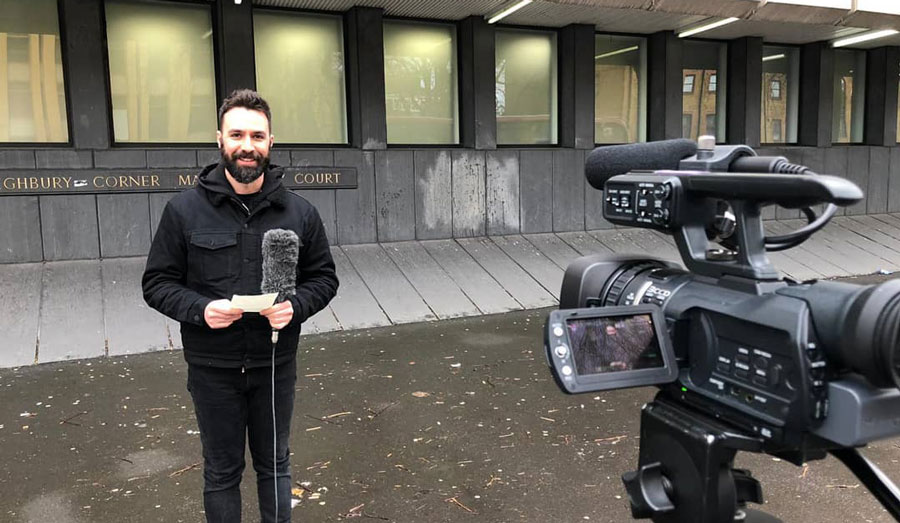




.jpg)



